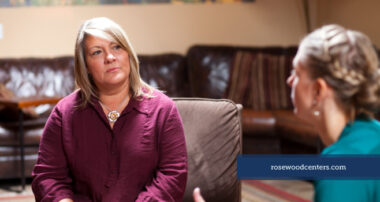By Deborah A. Russo, PsyD., The Rosewood Centers for Eating Disorders Director, The Rosewood Institute
 I will be fine Mom, I need to start school, and I can’t miss it! I will fall behind and never catch up and then it will be awful… I won’t get the scholarship I’m depending on.
I will be fine Mom, I need to start school, and I can’t miss it! I will fall behind and never catch up and then it will be awful… I won’t get the scholarship I’m depending on.
Please, please, I can do this on my own, I know I can. I am going to work really hard and do everything I am supposed to, I promise!
Stacie and her parents are at a difficult crossroad. Stacie is suffering with anorexia nervosa. She has spent her summer doing
intensive outpatient treatment, but, her medically concerning symptoms are not improving. The family has been informed that a higher level of care is recommended for Stacie.
To see Stacie now is to see a different girl from just 3 months ago. Hair brittle, eyes no longer aglow, cheeks sunken, shoulders caved and cadence stifled. Where did my daughter go? How did this happen? What did we do to make this happen? Stacie’s parents ruminate over these questions. They are not alone.
It is estimated that 20 million women and 10 million men suffer from a clinically significant eating disorder at some time in their life (Wade, Keski-Rahkonen, & Hudson, 2011).
Youth are most at-risk with 95% of eating disorder manifesting between the ages of 12 and 25 (SAMHSA, The Center for Mental Health Services, and office of the U.S. Department of Health and Human Services). And, Anorexia nervosa has the highest mortality rate of psychiatric disorders among youth.
If an eating disorder takes hold of a child, it also takes hold of the family. It blindsides the child and those around her/or him who love them. Because they are immersed in secrecy, eating disorders can be well hidden and denied. Parents may blame themselves to the point of making themselves sick, or perhaps so shamed about it they do not reach out for the support and guidance they so desperately need. What to do?
If you are concerned about your child:
First-things-first. Throw away the Blame Game and focus on fighting the eating disorder together. If currently in treatment, and a more intensive program is recommended by the treatment team/provider, seriously consider this feedback. If you are having your first concerns, consult your child’s pediatrician. A discussion regarding a thorough medical and psychological assessment may be in order. They may be aware of a mental health specialist to consult. If not, do your research and be a fully informed parent to secure the proper treatment your child requires.
Several signs that a parent should seek counsel for their child, and guidance for themselves:
- Unexplained weight loss, or failure to gain weight required for optimal health for age and height
- Excessive exercising often in secret and isolation
- Severe mood changes, frequent tearfulness, isolating from normal activities, or anxiety that does not remit/ free floating worry and fear
- Eliminating food groups necessary for proper nutrition
- Unrelenting weight/shape/body image disparaging
- Preoccupations with food, menu planning
- Hoarding food and using food to quell feelings regularly, laxative use/abuse
Medical complications may include, but are not limited to:
- Malnutrition, tooth decay & mouth ulcers
- Kidney Failure
- Enlargement of the heart / heart failure
- Severe electrolyte imbalance/ Hormonal Dysregulation
- Infertility
- Frequent bone fractures: Osteoporosis / Osteopenia (Not readily reversed with weight recovery)
- Stunted Growth, Delayed puberty
Eating disorders can destroy relationships, joy, purpose and young lives. They can be difficult to deal with, the journey takes time and it challenges everyone in the family. However, new life skills, closer relationships, and regained health are the fruits of treatment for the family. Parents need support from other parents who have been down the same difficult road. In one support group, another parent encourages Stacies’ parents. He says, “Get to this now, so you can support your child to make her dreams come true. ……..first things first”.
* This article is not intended to be a substitute for professional advice, diagnosis, or treatment. Please seek an evaluation from a qualified medical and mental health professional. The stories within this article have been de-identified to maintain the privacy and confidentiality of individuals.









